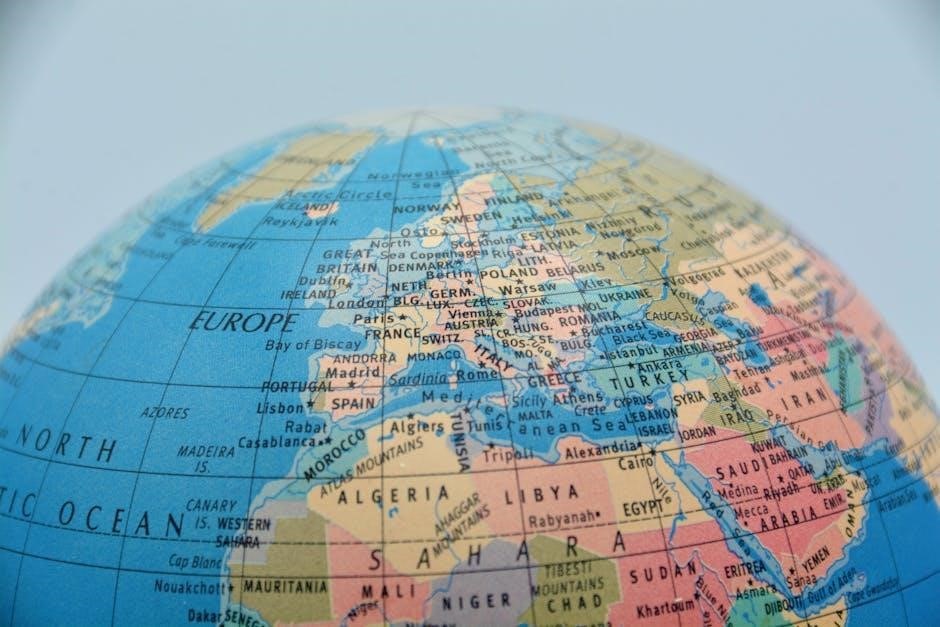Walter Rodney’s seminal work, How Europe Underdeveloped Africa, critically examines the exploitation of Africa by European powers, highlighting the historical roots of underdevelopment and its lasting impact.
1.1 Overview of Walter Rodney’s Book

Walter Rodney’s How Europe Underdeveloped Africa is a groundbreaking analysis of Africa’s exploitation by European powers. The book, first published in 1972, argues that Africa’s underdevelopment is not a natural phenomenon but a direct result of centuries of external interference. Rodney examines the historical processes of slavery, colonialism, and economic exploitation, revealing how these systems systematically drained Africa’s resources and stifled its development. He challenges Eurocentric narratives by centering Africa’s agency and resilience. The book is structured to provide a comprehensive understanding of the mechanisms of underdevelopment, emphasizing the role of imperialism and capitalism in perpetuating inequality. It remains a pivotal work in African studies and post-colonial discourse.
1.2 Historical Context and Relevance
Walter Rodney’s How Europe Underdeveloped Africa was published in 1972, a time of heightened post-colonial consciousness across Africa. The book emerged amid global discussions on decolonization, offering a radical perspective on Africa’s historical trajectory. Rodney’s analysis is rooted in the centuries-long exploitation of Africa, beginning with the transatlantic slave trade and extending through colonialism and neocolonialism. His work remains highly relevant today, as it provides a framework for understanding the persistent economic and political challenges facing the continent. Rodney’s assassination in 1980 underscored the controversial nature of his ideas, yet his book continues to be a cornerstone of African studies and anti-imperialist scholarship.

The Role of Slavery in Africa’s Underdevelopment
Slavery disrupted Africa’s societies, depopulated regions, and drained its labor force, laying the foundation for economic underdevelopment and inequality perpetuated by colonial exploitation.
2.1 The Transatlantic Slave Trade
The transatlantic slave trade was a central mechanism of Africa’s underdevelopment, forcibly removing millions of Africans to fuel European economies. This systemic exploitation depleted Africa’s labor force, disrupting local economies and societies. The trade not only enriched European powers but also entrenched African dependence, as resources were diverted to serve colonial interests rather than domestic development. Rodney emphasizes how this extraction of human capital stifled Africa’s potential for self-sustenance and growth, creating long-term economic and social disparities. The legacy of this exploitation continues to influence Africa’s struggle for development in the modern era.
2.2 Economic Impact of Slavery on Africa

Slavery had a devastating economic impact on Africa, as the continent’s resources were systematically extracted to fuel European economies. The removal of millions of Africans disrupted local industries, agriculture, and trade networks, leading to economic stagnation. Wealth that could have been invested in Africa’s development was instead used to enrich European powers. Rodney argues that this drain of human and material resources hindered Africa’s ability to develop independently. The focus on supplying raw materials for European markets further entrenched underdevelopment, as African economies became reliant on external systems rather than fostering internal growth and technological advancement. This economic exploitation laid the foundation for long-term dependency and inequality.
Colonialism and Its Effects on Africa
Colonialism disrupted Africa’s development, as European powers extracted resources and labor, stifling local industries and economies. Rodney emphasizes how colonial policies deliberately underdeveloped the continent.
3.1 European Colonial Policies

European colonial policies were designed to exploit Africa’s resources and labor for European benefit. These policies systematically extracted wealth, suppressed local industries, and imposed economic structures that served European interests. Rodney argues that such policies were intentional, aiming to underdevelop Africa and maintain its dependency. By controlling trade and investment, European powers ensured that Africa’s economy remained subordinate, hindering its ability to develop independently. These colonial strategies laid the foundation for long-term underdevelopment, perpetuating poverty and inequality across the continent.
3.2 Exploitation of Resources and Labor
European colonial powers extensively exploited Africa’s resources and labor to fuel their own economic growth. Rodney highlights how raw materials such as gold, diamonds, and agricultural products were extracted en masse, often under forced labor conditions. This exploitation disrupted local economies and prevented the development of indigenous industries. African labor was coerced into serving European interests, whether through plantation work, mining, or infrastructure projects. Such practices not only enriched Europe but also impoverished Africa, creating a cycle of dependency and underdevelopment. The exploitation of resources and labor remains a critical factor in understanding Africa’s stalled economic progress during the colonial period.
Economic Exploitation and Underdevelopment
Europe’s exploitation of Africa’s resources and labor enriched European economies while leaving Africa underdeveloped, disrupting local industries and fostering dependency through unequal trade and investment practices.
4.1 Exploitation Through Trade
European powers exploited Africa through unequal trade practices, extracting raw materials at low prices while selling manufactured goods at high costs. This disrupted local economies, stifling industrial growth and fostering dependency. Trade policies were designed to benefit Europe, draining Africa’s wealth and undermining self-sufficiency. Rodney highlights how Africa’s resources were systematically siphoned to fuel European development, while African nations were forced into a peripheral role in the global economy. This economic imbalance perpetuated underdevelopment, as Africa’s potential for industrialization and economic autonomy was repeatedly stifled by colonial and neocolonial trade systems.
4.2 Exploitation Through Investment
European investment in Africa was primarily geared toward extracting resources for European benefit, rather than fostering local development. Rodney argues that foreign capital was invested in industries that served colonial interests, such as mining and plantations, while neglecting sectors that could bolster African economies; This exploitative approach ensured that wealth generated in Africa flowed back to Europe, perpetuating underdevelopment. Infrastructure projects, like railways, were built to facilitate resource extraction rather than improve living conditions for Africans. Such investments reinforced dependency, as African economies remained tethered to European markets, hindering the growth of indigenous industries and self-sustaining development. This cycle of exploitation deepened Africa’s economic subjugation.

The Legacy of Walter Rodney’s Work
Walter Rodney’s work remains a cornerstone in African studies, offering critical insights into colonialism’s impact. His book continues to influence contemporary discussions on Africa’s development and global inequality, sparking debates on historical exploitation and its modern repercussions;

5.1 Impact on African Studies

Walter Rodney’s How Europe Underdeveloped Africa revolutionized African studies by challenging Eurocentric narratives and emphasizing Africa’s historical agency. The book shifted discourse from victimhood to active resistance, redefining underdevelopment as a consequence of exploitation rather than inherent backwardness. Its rigorous analysis of colonialism, slavery, and economic extraction has made it a foundational text in postcolonial scholarship. Rodney’s work continues to inspire researchers, activists, and policymakers, offering a framework for understanding Africa’s contemporary challenges. Its influence extends across disciplines, from history to economics, ensuring its relevance in modern academic and political debates about Africa’s development and global inequality.

5.2 Relevance in Contemporary Discussions
Walter Rodney’s How Europe Underdeveloped Africa remains highly relevant today, offering insights into ongoing debates about global inequality, neocolonialism, and sustainable development. The book’s analysis of exploitation through trade and investment resonates with contemporary issues like resource extraction, debt crises, and unequal international relations. Rodney’s ideas are frequently invoked in discussions about African sovereignty, economic justice, and the legacies of colonialism. His work continues to inspire movements for decolonization and pan-Africanism, providing a critical framework for understanding and addressing the challenges facing Africa in the 21st century. Its timeless lessons ensure its enduring influence in shaping modern discourse on development and equity.
Walter Rodney’s work underscores the historical roots of Africa’s underdevelopment, emphasizing the need for African-led solutions to break cycles of exploitation and achieve true liberation.
6.1 Summary of Key Arguments
Walter Rodney’s How Europe Underdeveloped Africa argues that Africa’s underdevelopment is rooted in centuries of exploitation by European powers. The transatlantic slave trade drained Africa of its labor force, disrupting societal structures and economies. Colonialism further entrenched underdevelopment by extracting resources and imposing systems that served European interests, stifling local industries and fostering dependency. Rodney emphasizes that underdevelopment is not a natural state but a result of deliberate historical processes. He advocates for a radical rethinking of Africa’s relationship with the global economy and a shift toward self-determination to break the cycles of exploitation and achieve true development.

6.2 Final Thoughts on Africa’s Path Forward
Walter Rodney’s work underscores the necessity for Africa to reclaim its destiny through self-determination and economic independence. He advocates for a radical break from colonial legacies and the adoption of policies that prioritize African needs over external interests. Rodney emphasizes the importance of regional cooperation, investment in education, and harnessing Africa’s resources for its people. By challenging imperialist structures and fostering indigenous development, Africa can chart a path toward sustainable growth and prosperity. Rodney’s vision remains a powerful call to action, urging Africans to unite and reclaim their continent’s future, free from the shackles of historical exploitation.